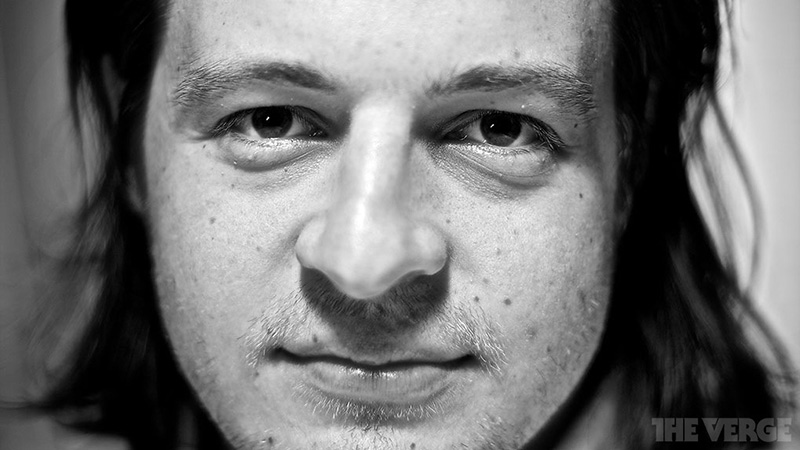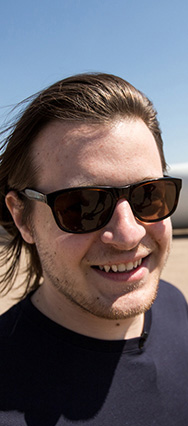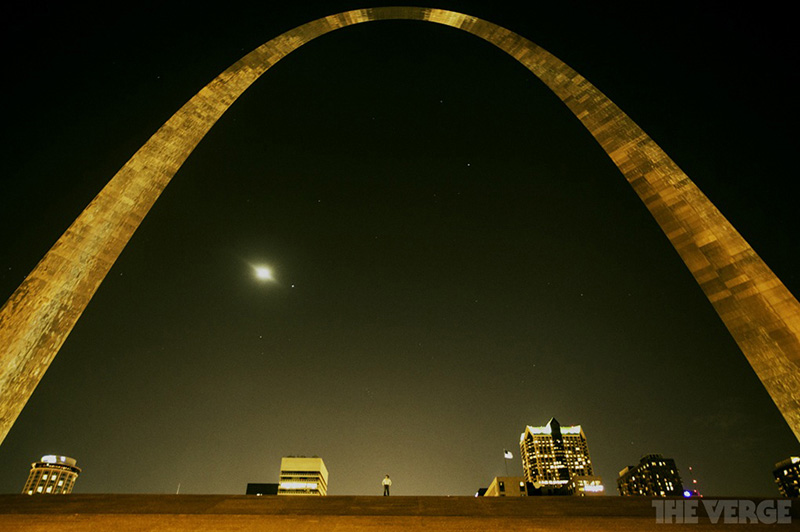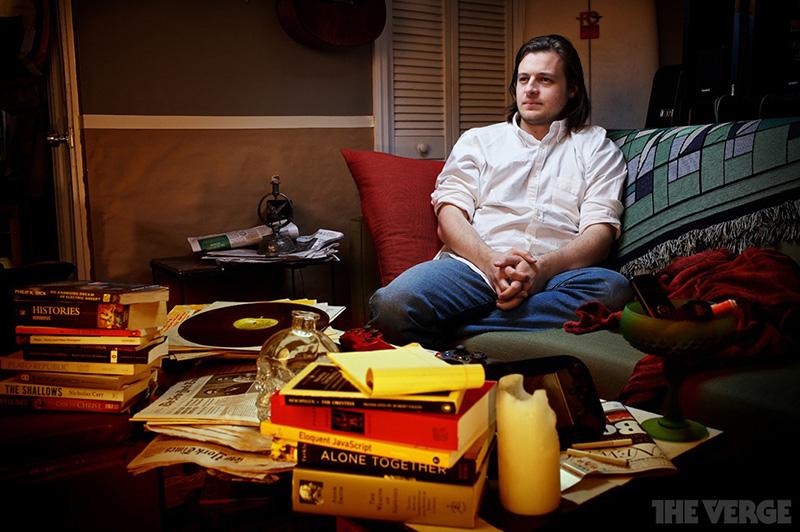I'm still here: return to the Network a year later without the Internet

I was wrong.
A year ago, I left the Internet. I thought that it adversely affects my productivity. I thought he lacked sense. I thought he was "corrupting my soul."
')
A year has passed since I "surfed the Web" or "checked mail" or "liked" something in a figurative sense instead of the usual "finger up." I learned to stay disconnected, as planned, I am free from the Internet.
Now I am going to tell you how it all solved my problems. I was going to be enlightened, more "real." More perfect.
Actually it's 8 pm and I just woke up. I slept all day, woke up with eight voice mail messages from friends and colleagues. I went to my usual cafe for lunch, the Knicks, my two newspapers and a copy of The New Yorker. And now I look at the Toy Story, while staring and blinking at the blinking cursor in this text document, hoping that he would write himself, generate those insights of my life that I could not achieve.
I did not want to meet such a Paul at the end of my annual journey.
At the beginning of 2012, I was 26 years old, and I was exhausted. I wanted to break out of modern life - an endless cycle of incoming
E-mails, the unceasing stream of information from the World Wide Web, drowning out my sanity. I wanted to escape.
I thought that the Internet could be an unbalanced condition for us, the people, or at least for me. Maybe I was too addicted to handle, or too impulsive to limit myself. I have constantly used the Internet since the age of 12 and could not imagine my life without it since the age of 14. I went from a newspaper distributor to a web designer, and then to a technology writer in less than 10 years. I lived with a sense of continuity of connection and infinity of information. I was wondering what else life has to offer. “Real life”, so to speak, was waiting for me on the other side of the web browser.
My plan was to leave work, move to my parents' house, read books, write books, and lie on the couch during breaks. In one fell swoop, I would overcome all the crises approaching me. I would find the real Paul somewhere far beyond the edge of noise and would be the best version of myself.
But for some reason, The Verge wanted to pay me to leave the Internet. I could stay in New York and share my discoveries with the world, broadcast my life free from the Internet to the inhabitants of the Network, spread wisdom from my high tower.
My goal as a technology writer was to find out what the Internet has done for me over the years. Understand the Internet by studying it "at a distance." I would not just become a better person, I would help all of us to become better people. As soon as we understand how the Internet corrupts us, we will finally be able to resist this.
At 11:59 pm, on April 30, 2012, I pulled out my Ethernet cable, turned off Wi-Fi and changed my smartphone to a simple “dialer”. It was a really good feeling. I felt free.
A few weeks later, I found myself in a crowd of 60,000 ultra-orthodox Jews, crowded into the urban clearing of New York to learn about the dangers of the Internet from the world's most respected rabbi. Seriously. Outside the stadium, I was noticed by a man waving one of my articles about leaving the Internet. He was delighted with the meeting with me. I decided to leave the Internet for many reasons, similar to his religion, which expressed concerns about the modern world.
“He reprograms our relationships, our emotions and our sensibilities,” said one of the rabbis. - “He destroys our patience. He turns children into clipping vegetables. ”
It should have been awesome.

I was having a dream
It all started fine, I tell you. I really limited myself and enjoyed it. My life was full of unplanned events: meetings, frisbees, bike rides and Greek literature. Without a clear understanding of how this happened, I wrote half of my novel and sent an essay to The Verge almost every week. In one of the first months, my boss expressed a slight disappointment about how much I wrote, which has never happened before or since.
I lost 15 pounds of weight without any effort. Bought new clothes. People kept telling me how good I looked, how happy I looked. During one of the examinations, my therapist literally tapped himself on the shoulder.
I was a little bored, a little lonely, but I found wonderful changes in my life. In August, I wrote: "Boredom and lack of motivation force me to do things that are really important to me, such as writing or spending time with other people." I was completely sure that I had everything under control, and I talked about it to everyone.
After my head cleared, my attentional stability improved. In my first or second month, 10 pages of the Odyssey were hard labor. Now I can read 100 pages in one sitting, and if it reads easily and I am carried away, then there are several hundred.
I learned to accept ideas for which there is little blog post, but enough of a statement the size of a novel. Breaking out of the anechoic chamber of the Internet culture, I discovered that my ideas are developing in new directions. I felt different, a little eccentric, and I liked it.
Having got rid of my favorite smartphone, I was forced to crawl out of the shell in difficult social situations. It turns out that without my constant absentmindedness, I was more attentive to other people. I could no longer maintain the relationship on Twitter - I had to find them in real life. My sister, who had previously tried in vain to talk to me while I listened to her only half, now loves our conversations. She says that I am less emotionally removed and I care more about her condition - in general, I became less cret than I was.
Besides, I don’t know how to relate this to the rest, but I cried while watching “ Les Miserables ”.
In those first few months it seemed that my hypothesis was confirmed. The Internet kept me from being true, better Paul. I plugged the plug and turned on the light.

Harsh reality
When I left the Internet, I thought my journal articles would be something like “I used a paper map today, and it was funny!” Or “Paper books? What is this ?! ”or“ Does anyone have a downloaded Wikipedia drive? ”. That did not happen.
For the most part, the practical aspects of this year have gone unnoticed. I had no orientation problems in New York, and in other places I bought paper maps. It turned out that paper books are really good. I didn’t compare ticket prices, I just called Delta and took what they offered.
In general, most of the things I learned can be learned both with the Internet and without it - you do not need to go on a one-year Internet diet to realize that your sister has feelings.
A big change was the “ordinary” mail. This year I started a mailbox ( PO Box ), I can not tell you how much joy it brought me, being hammered by letters from readers. This is something tangible, and this is not to convey an e-card.
With a charming, neat handwriting, one girl wrote on a real sheet of paper: “Thank you for leaving the Internet.” Not as an insult, but as a compliment. This letter meant a lot to me. But then I felt bad, because I never wrote response letters.
And then, for some reason, even going to the post office became a job for me. I began to be afraid of letters and was ready to send them back. As it turned out, a dozen emails per week can be compared with hundreds of e-mails per day. And so it happened in most areas of my life. A good book required motivation to read, regardless of whether I have the Internet as an alternative or not. Exiting the house to meet people required exactly the same courage as it usually does.
At the dawn of 2012, I learned to make wrong decisions in a new way, without the Internet. I abandoned my good habits and found new vices. Instead of turning boredom and lack of motivation into learning and creativity, I turned to the side of passive consumption and social retreat.
In the new year, I no longer ride my bike so often. My frisbee collects dust. I haven't met people for weeks. My favorite place is the sofa. I throw my legs on the coffee table, play a video game and listen to an audiobook. I choose some meaningless game like Borderlands 2 or Skate 3 , while my brain relaxes under an audiobook or just silence.
People who need others
So the moral choices haven't changed that much with the lack of the Internet. Practical things like paper cards and shopping are not too difficult to get used to. People are still happy to point you in the right direction. But without the Internet, it became really difficult to search for people. Making a phone call is harder than sending an e-mail. It is easier to send SMS or meet in video chat, than to come to someone's home. Not that these obstacles are insurmountable. I overcame them at the beginning, but I could not finish what I had begun.
It is hard to say what really changed. I think those first months were so good because I felt the lack of pressure from the Internet. My freedom was palpable. But when I stopped looking at my life in the context of “I do not use the Internet,” existence outside the Web became routine, and my worst sides began to emerge.
I could stay at home for a few days at a time. My phone could be dead and no one could contact me. At some point, parents were bored to guess whether I was alive or not, and they sent my sister to my house. On the Internet, it was easy to convince people that I was alive and well, it was easy to interact with colleagues, to be a significant part of society.
So many pages have been written that deride the false concept of “friend on Facebook”, but I can tell you that “friend on Facebook” is better than nothing. My best friend at a distance, the only one with whom I called up every week for many years, moved to China this year, and since then I have not spoken to him again. My best friend, who lives in New York, just disappeared into his work, while I could not follow the collapse of our plans.
I fell out of the flow of life.
In March of this year, I ironically attended a conference in New York called “Teoretizing the World Wide Web”. It was full of graduate students and other scholars, making complex reports on the definition of reality, on how feminism looks in the post-digital era and other such things. At first, I was a little smug because I thought that they deal only with theories, which meant that the Internet was in everything, while I was learning a separate life. But afterwards, I talked to Nathan Jurgenson, a theoretician who helped organize the conference. He drew attention to the fact that in the virtual there is a lot of “real”, and in real it is fully “virtual”. When we use a phone or computer, we are still people of flesh and blood, occupying space and time. When we are jumping somewhere in the field, throwing our gadgets somewhere far away, the Internet still affects our thinking: “Will I tweet about this when I get back?”.
My plan was to leave the Internet and thus find the “real” Paul, get in touch with the “real” world, but the real Paul and the real world are already inseparably connected with the Internet. I do not mean that my life has not changed with the refusal of the Internet, but because it was not real life.

Family time
A couple of weeks ago, I went to Colorado to see my brother before he was transferred to Qatar along with the Air Force. He had a small child, a five-month-old half-face named Kasia ( Kacia ), which I saw only in photos, kindly sent by mail to my sister-in-law. I spent one day with my brother and the next morning I went with him to the airport. Stunned, I watched him kiss his wife and children goodbye. It is unfair that he had to leave. He was a hero for his children, and I hated the fact that he would have to leave them for 6 months.
My colleagues Jordan and Stefan met me in Colorado to take a road trip back to New York. The idea was to squeeze my whole year into a small documentary and spend hours on the road discussing what happened to me and what might happen later. Before we left, I spent a little more time with the children, trying my best to help my sister-in-law, to be a super-uncle. Then we had to leave.
On the road, Jordan and Stefan asked me questions. "Do you think you were too strict with yourself?" - "Yes." “Was this year successful?” - “No.” “What do you want to do when you return to the Internet?” - “I want to try for other people.”
We stopped in Huntington, WV to meet with my hero, Justin McElroy of Polygon . I met with Nathan Jurgenson in Washington. I thought a lot about whether I could succeed on the Net in the things that I lost outside of it. I asked for advice.
What I know for sure is that I cannot blame the Internet, or any circumstances for my problems. I still have many of my priorities that I had before leaving: family, friends, work, education. I have no guarantee that I will adhere to them upon return - most likely I will not, to be honest. But at least I will know that the Internet is not at fault. I will know who is responsible for everything and who can fix it.
On Tuesday, the last night of our trip, we stopped near the river flowing from New York to take a picture of the Manhattan skyline from New Jersey. It was a cold, clear night, I leaned against the shaky railing of the bridge and tried to take a comfortable pose for the picture. I was so close to New York, so close to completion. I missed the peaceful solitude of my apartment and was a little afraid to return to isolation. In two weeks I will be back on the Internet. I felt defeated. I felt as if I was again giving up. But I knew the Internet was the place where I should be.

12:00, May 1, 2013
I read so many blog posts, magazine articles, and books that the Internet makes us lonely, or stupid, or stupid and lonely at once, that I began to believe them. I wanted to find out what the Internet “did to me” so that I could resist. But the Internet is not an individual race, it is something that we do together, with each other . The Internet is where people are.
On my last day in Colorado, I sat down next to my five-year-old niece Kazaya ( Keziah, oh, those names - note of the translator ) and tried to explain to her what the Internet is. She had never heard of him, but she communicates a lot with Skype and her grandparents. I asked if she was interested, why I didn’t call her on Skype this year. She was interested.
“I thought you just didn't want to,” she said.With tears in my eyes, I drew to her what the Internet is. Drew computers, telephones and televisions with thin lines connecting them. "These lines are the Internet." I showed her my computer, drew a line for it and erased it.
“I lived a year without using the Internet,” I told her. “But now I'm coming back and I can call you again.”When I return to the Internet, I may not be using it correctly. Perhaps I will waste time, be distracted or click on the wrong links. I will not have so much time for reading, self-discovery or writing a great American science fiction novel.
But at least I'll be in touch.
Source: https://habr.com/ru/post/178707/
All Articles